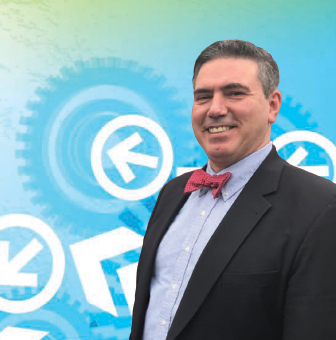All
New Leadership at NEFI

New England Fuel Institute President & CEO Sean Cota addresses the energy industry’s most important issues and lays out his agenda for 2018
The name Cota has been synonymous with New England’s fueling business for about as long as the New England Fuel Institute has existed. In fact, NEFI was founded one year after the husband-and-wife team of Ken and Helen Cota opened their Vermont-based fuel delivery business, Cota & Cota, in 1941.
 It’s fitting then that as the association closed out its 75th anniversary in December 2017, a new chapter in its history began with Ken and Helen’s grandson Sean Cota sworn in as NEFI President and Chief Executive Officer. A member of the NEFI Board of Directors since 1990, and its Chairman from 2008-2010, Cota steps into the role of President and CEO with a lifetime of industry experience and a resume long enough to fill the entirety of this article. He’s held top posts at the Petroleum Marketers Association of America, National Oilheat Research Alliance, and Vermont Fuel Dealers’ Association; served as president of Cota & Cota until his retirement from the family business in 2011; and represented his fellow fuel marketers dozens of times before Congressional committees, regulatory agencies, and the local, state and national news media.
It’s fitting then that as the association closed out its 75th anniversary in December 2017, a new chapter in its history began with Ken and Helen’s grandson Sean Cota sworn in as NEFI President and Chief Executive Officer. A member of the NEFI Board of Directors since 1990, and its Chairman from 2008-2010, Cota steps into the role of President and CEO with a lifetime of industry experience and a resume long enough to fill the entirety of this article. He’s held top posts at the Petroleum Marketers Association of America, National Oilheat Research Alliance, and Vermont Fuel Dealers’ Association; served as president of Cota & Cota until his retirement from the family business in 2011; and represented his fellow fuel marketers dozens of times before Congressional committees, regulatory agencies, and the local, state and national news media.
That’s not what he’s here to talk about, though.
Having started 2018 with one of the longest and most severe cold snaps on record, NEFI’s members and the whole deliverable fuels industry face challenges at virtually every turn. Some are new. Some have been around since the first heating oil and propane gallons were delivered. All are important to the fuel business of today and tomorrow. Addressing them demands strong, sensible leadership and a clear vision for the future.
It’s those challenges and this vision that Cota discusses in the following exclusive interview, his first as NEFI President and CEO.
Congratulations on the new post! What is your “first order of business” as NEFI President and CEO?
Thanks, Sam. First, let me say that it’s a true honor to be named to this post — one I don’t take lightly for a second. As you know, NEFI has been a significant force for Main Street American energy businesses for over 75 years. The organization’s history speaks for itself. Our efforts advocating for industry at the regional and national level reverberate beyond just our dues-paying members or your readers. The ripple effect can be felt all over the country. In short, everything we do matters, for members and non-members alike. It matters for the hardworking men and women they employ and for their families. It matters for their customers, and ultimately, the future of our industry.
With that being said, from a big-picture perspective, my first and last order of business will always be to do what I’ve strived to do from the very beginning of my career. That is, protect the interests of the fuel business and help them do what they do best — deliver quality service and home comfort to millions of American homes.
It’s been a challenging winter in this regard. Just weeks into the job our industry was hit with a cold snap the likes of which we have not seen in generations. My chief priority was doing all we can to make sure that our wholesale and retail businesses had the resources they needed to keep their customers safe and their businesses running as smoothly as possible. We worked closely with our association partners and contacts in the federal government to secure necessary hours-of-service waivers for the transportation of heating fuels. We also communicated regularly with regional suppliers and participated in weekly conference calls with state and local government officials, the Coast Guard, pipeline and rail companies, and others.
We want our members to know NEFI stands with them, especially in times of great hardship, and need to make them aware of resources that are available to them. I will personally reach out to each member over the coming year. I will take steps to enhance our communications infrastructure, so we can be even more responsive to the needs of our growing membership.
What else is on your agenda for the coming year?
My immediate goals are to strengthen our brand and communication offerings, expand our membership and increase awareness of the benefits of NEFI membership. Recruitment, retention and outreach are all crucial to our success. But just as vital is the work we do in Washington, DC. Rest assured, NEFI will remain a fierce advocate for America’s Main Street home energy businesses. With the added assistance of our friends and supporters throughout the Northeast, NEFI can broaden its influence so that it echoes well outside of the Capital Beltway.
One of the core functions of NEFI, or any trade association for that matter, is to assist with regulatory compliance. While we have been providing this service to some extent, it is my hope we can do much more to provide timely guidance and support to our members, to help them reduce compliance costs and associated fines and fees. NEFI will also undertake a wholesale review of what regulations constitute an undue burden, increase costs, or otherwise affect fuel companies’ ability to serve their customers. The Trump administration may offer some opportunities in this regard as it seeks to cut red tape.
Last but definitely not least, we will work to strengthen the value of our events, trade shows and business conferences, and of course, educational opportunities. These offerings have always served as the backbone of NEFI. They need to be revamped to reflect the changing needs in our industry as well as the dynamics of the association business.
How do you see NEFI’s strategic planning process evolving in response to the current political situation in Washington?
The NEFI strategic planning process had been somewhat “on hold” due to both my hiring and the related transition, and of course, the historic winter we just experienced. This process has resumed, however, and I have full faith in the leadership team, led by NEFI Chairman Mike Estes, of Estes Oil & Propane, and Vice Chair Peter Aziz, of BantamWesson. I expect some risky but ambitious goals to come out of the process, and that this organization and the industry will be all the stronger for it.
One area on which we will continue to focus is our advocacy efforts in Washington. With tax reform now out of the way, the White House and Congress have promised to move on to other “big-ticket” items such as immigration reform and an infrastructure package. These are important and worth keeping an eye on, especially the latter. Congress is eyeing a possible increase in federal excise taxes for gasoline and diesel fuel to help generate billions of dollars for highway infrastructure and mass transit programs.
The Trump administration and Republicans in Congress are also expected to try and ease permitting and environmental review requirements for natural gas pipelines. On the other hand, they are also expected to lift export restrictions on liquefied natural gas (LNG). Doing so would create greater parity between natural gas and competing fuels, such as crude oil, refined petroleum products and biofuels, which can be easily exported.
At the same time, 2018 will also see a return of issues that have a more direct effect on our industry. The law that authorizes the National Oilheat Research Alliance (NORA) expires in early 2019, so there will be an effort to renew the program. The president has also proposed opening up all offshore areas to oil and gas drilling, including the Northeast and Mid-Atlantic, which has generated much controversy.
In addition to responding to these sorts of issues, NEFI Government Affairs Committee Chairman Scott E. MacFarlane, of MacFarlane Energy, would also like NEFI to be proactive and “go on the offensive” so to speak. Scott has proposed the creation of three special committees to research and develop policy proposals related to highway regulations and the Jones Act, regional electrification and carbon tax initiatives, and biofuels polices that affect the continued growth of renewable fuels in our industry.
That’s interesting! What kinds of issues would these special policy committees be tasked with addressing?
After the most recent winter, perhaps the work of the Transportation Policy Committee is most pressing. This group would be tasked with finding areas of state and federal highway regulations that make it difficult to hire, train and retain drivers. For example, there are rules that make obtaining a HAZMAT endorsement difficult. You have to be 21, even if you have relevant experience from the military. You must also undergo a TSA background check that can take weeks or even months. Yet, in many states you can purchase a firearm after a background check that takes minutes.
These problems affect the ability of our members to operate their businesses and successfully serve their customers. Another issue is the Jones Act, a nearly 100-year-old maritime law designed to protect the domestic shipping industry. It requires that ships moving products port-to-port in the United States be American owned, built, flagged and manned. Because utilizing Jones Act ships is more expensive, it provides an incentive to companies outside of the Northeast to export energy rather than ship it up the coast. That has left our region more dependent on imports than in other parts of the country.
One of the biggest stories of this winter was that, at the height of January’s cold spell, New England utilities suddenly drew some 80 million gallons of oil for power generation — roughly the amount of oil used annually to heat all the homes in the state of Vermont! Power generators have become increasingly dependent on natural gas over the last two decades and turn to fuel oil during periods of peak demand. New England’s system operators have conceded that this arrangement is not the model of sustainability. NEFI will be looking at ways we can improve the situation for the good of New England’s residential heating oil users.
Just as regional power generators struggle to secure fuel and meet growing electricity demands, state governments throughout the Northeast are looking to electrify the transportation and space heating sectors. Their solution: electric vehicles and heat pumps. They plan on paying for these policy initiatives through carbon taxes. NEFI needs to be ready to support our state and local partners as they deal with these issues.
On biofuels, Congress has retroactively renewed the biodiesel tax credit for 2017, but its fate for 2018 and beyond is uncertain. Lawmakers and the administration are also considering changes to the EPA’s Renewable Fuel Standard, which is the federal program that encourages the blending of biofuels including biodiesel into the fuel supply. These issues affect our industry’s move toward biodiesel-blended heating oil and the development of locally sourced feedstocks, such as wood-to-biofuel technologies. NEFI has recently completed a regional biodiesel study and will be issuing results very soon.
With carbon tax debates on the docket for multiple Northeast state legislatures, how can NEFI help state heating oil associations ensure that the industry doesn’t bear the brunt of new fossil fuel regulations?
Much of the lobbying on these kinds of issues is in the realm of the state associations: the Connecticut Energy Marketers Association, Massachusetts Energy Marketers Association, Maine Energy Marketers Association, Energy Marketers Association of New Hampshire, Oil Heat Institute of Rhode Island and Vermont Fuel Dealers’ Association. However, as a regional entity, NEFI certainly has a role in coordinating messaging and public relations efforts and providing as much useful research and data as we can. There may also be a role for our grassroots program. We have over 4,000 unique industry emails in our advocacy list that we may be able to leverage to assist in the state and local efforts.
What are your thoughts on President Trump’s renewed call for the elimination of the federal Low Income Home Energy Assistance Program (LIHEAP)?
NEFI has always supported LIHEAP funding and will continue to do so. For our members who participate in fuel assistance and who have customers depending on the program to help heat their homes, it is essential. Many of these people are disabled veterans, active duty military families, and the elderly. They need the help, and the elimination of the program could blow massive holes in state fuel assistance budgets and result in new or increased taxes and fees or tougher leveraging programs such as margin-over-rack or discount-off-retail.
Yet we are aware of and concerned about issues relative to the administering of fuel assistance programs in the states, which are funded by LIHEAP. These programs should encourage greater dealer participation. But the sad truth is that in some states it does the opposite. President Trump and his Department of Health & Human Services oversee these programs to an extent, and given his dislike of the program, perhaps there is an opportunity for us to request some improvements. We have formed a joint task force with the Petroleum Marketers Association of America (PMAA) to educate the administration on the value of this program as well as possible avenues for improvement.
How can NEFI work most effectively, not only with other state associations but also with regional and national organizations?
As I mentioned, we can help coordinate messaging and share data where possible. One of the great things about being in a niche industry like ours is that it’s relatively easy to get in touch with these associations’ leaders and key members. The benefits of open, transparent cross-association communications cannot be overstated. NEFI members expect their voices to be heard and a seat at the table, not just across state lines but with other industries at all levels. That’s a big part of why they join NEFI. So, it is our job to strengthen relationships with longtime partners such as PMAA, the National Oilheat Research Alliance (NORA), the National Association of Oil and Energy Service Professionals (OESP), the Oilheat Manufacturers Association (OMA) and the National Biodiesel Board (NBB). But we also need to cultivate new partnerships with likeminded organizations, especially as we tackle some of the issues we discussed earlier. We’ll butt heads from time to time, of course, but at the end of the day, these kinds of relationships are how battles are won these days. So, it’s in our mutual interest to support one another and work together.
Natural gas utilities have come under renewed scrutiny for some of their supply and pricing practices. How does this help shift the discussion on regional energy policy?
Hmm … I’m not sure how much I can say without their lawyers coming after me. I will say this, though: the New England Fuel Institute is the New England Fuel Institute and not the New England Oil Institute or Propane Institute or Coal Institute for a reason — our diverse membership is responsible for supplying a number of different reliable energy sources to homes and businesses across the region. We know that a diverse energy mix is critical for a fair marketplace, for a healthy economy and for the general safety and security of the Northeast and the country as a whole. Sound energy policy reflects that same knowledge.
What would you say to those current and former members who may have felt that their voices and interests haven’t been adequately represented by NEFI in the past?
I can only say that I will do everything in my power to ensure that their voices are always heard, and that I was named President specifically to serve the needs and best interests of our members. As someone who’s been in this industry for my whole life and in NEFI for the bulk of that time, I like to think I have a good grasp on those needs and interests, but I promise to keep an open door and an open mind, and to continue listening to all our members and fighting on their behalf.
Related Posts
 2024 Hedging Survey
2024 Hedging Survey
Posted on April 19, 2024
 Approved Oil Is Cleaning Up NYC
Approved Oil Is Cleaning Up NYC
Posted on April 17, 2024
 Show Your Work
Show Your Work
Posted on April 17, 2024
 Building Designated Alternative Fuel Corridors
Building Designated Alternative Fuel Corridors
Posted on April 17, 2024
Enter your email to receive important news and article updates.
